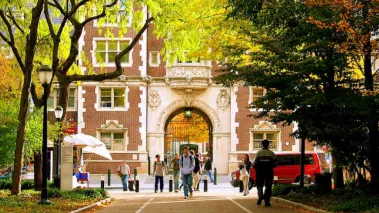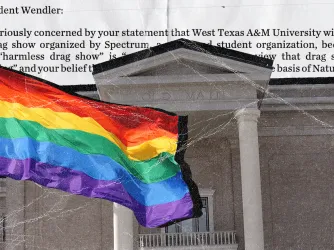Table of Contents
Penn’s isolated activists

On any given day at the University of Pennsylvania, one can find students actively promoting their group, cause, or event on Locust Walk, the school’s central walkway.
One morning, as I traversed the walk en route to my German lecture, I was shocked at how many different groups were already out campaigning. A political activism club had set up a table and was passing out flyers, two different drama groups were promoting their upcoming performances, and a hoard of students were lined up to purchase tickets to a fraternity event.
While these groups convene in the same location for promotional purposes, they still isolate themselves due to Penn’s campus culture, as groups with different ideological perspectives seldom interact. Individual clubs have their own internal friend groups, host private social events, and rarely partner with other clubs.
This isolation is particularly stark in regard to political groups. After scouring the event pages for both Penn Democrats and College Republicans, the two largest political groups on campus, the only joint event between the two groups I could find was a “Unity Shabbat Lunch,” which only 15 people attended (both groups combined represent hundreds of Penn students).
In an academic community like Penn, this sheds light on a deeper problem. We as a community are no longer interested in debate, discussion, or talking across lines of difference. We refuse to hear the other side due to our own perceived moral superiority. I was once the same way, disregarding others’ points of view due to my own convictions. However, by gradually wading into the waters of debate, I have grown to understand and engage with the views with which I disagree.
When students talk openly with one another about various issues, it can alleviate societal tension and lead to mutually beneficial solutions to problems. In an environment where discourse is common and respected, students can challenge each other’s beliefs and learn from their own logical fallacies. If we as a society are ever to come to an agreement on anything, we will need to communicate and find common ground.
There is already a group at Penn whose mission is to remedy this issue. The Penn Political Coalition “fosters collaboration among politically active Penn students,” according to their own description on Facebook. They help to fund groups on Penn’s campus with conflicting opinions in an effort to increase cooperation and coexistence.
Last October, the Penn Political Coalition held an event to discuss the future of the American healthcare system with several healthcare experts. Members from Penn College Republicans, Penn Democrats, and various political groups all attended, totalling nearly 80 students. Events like these are what Penn desperately needs, as they increase discourse and communication between isolated groups. Even if no common agreements are reached, these events still foster a sense of community.
As next semester approaches, students need to keep in mind the benefits of active and productive debate, not just at Penn, but at any school across the nation. We at Penn are lucky enough to have an administration that values free speech. Penn students should take advantage of this and begin building bridges between opposing viewpoints, not isolating themselves from those they disagree with.
Lachlan Mersky is a FIRE summer intern and rising sophomore at the University of Pennsylvania.
Recent Articles
Get the latest free speech news and analysis from FIRE.

FIRE statement on President Trump’s executive order to outlaw flag burning

Chinese officials force censorship of Thai gallery’s art exhibit about authoritarianism (proving the exhibit’s point)

The findings against Harvard are a blueprint for a National Campus Speech Code
